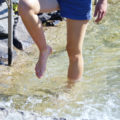Free of colds through the winter

It’s difficult to predict how a cold or flu epidemic might spread in 2021/2022. But one thing is for sure: it’s already here and it could last until April.
The Robert Koch Institute (RKI) has registered numerous airway infections – predominantly in children.
Media headlines are already asking: “Are we really heading for a cold epidemic?”
Experts are predicting a massive cold epidemic. Throughout lockdown, masks, hygiene measures and social distancing rules meant that cold and flu viruses hardly stood a chance. Now the current cold epidemic is causing worry for parents in particular. But why are children getting more colds now?
Paediatrician and Speaker for the North Rhine Professional Association, Alex Gerschauer, explains: “Unlike adults, children’s immune systems are still developing. If the immune system isn’t challenged, it can’t provide protection.” Which is making it easy for the RS virus, the most common cause of upper airway infections in infants and small children, as well as for other pathogens. It’s important for children’s health that the schools are not closed again. Gerschlauer is certain of one thing: “Closures to nurseries and schools damage children’s physical and psychological health.”
Right now, it’s not coronavirus but respiratory synzytial viruses (RSV) that are causing serious airway infections, particularly in small children. Home-schooling, closed nurseries, hygiene regulations, and face coverings all led to the cold season of 2020/21 hardly registering for children. But now the situation has changed. Schools have or had reopened, and mask mandates have been partially lifted during teaching. It will be a surprise to no-one that cases of colds, flu and infections are on the rise this autumn and winter.
The RKI reported a premature start to the cold pandemic in October. Coughs, sneezes, fevers, and sore throats are beckoning. The Robert Koch Institute (RKI) is the German government’s leading biomedical research facility, publishing weekly reports detailing the current cold and flu situation. For children, the cold pandemic started around six weeks earlier than usual. As they had minimal contact with viruses and germs during the last year, children’s immune systems were unable to learn how to deal with them.
This has now led to another problem. Coronavirus infections have been sharply increasing for weeks. The rate of coronavirus infections is currently accelerating, and the seven-day incident rates are also increasing. The problem with this is that while COVID-19 symptoms do have some distinct characteristics, they are often difficult to distinguish from those of other respiratory infections such as colds or flu (influenza).
Colds, flu and COVID-19 are all contagious airway infections that are caused by various viruses. Numerous different viruses, such as rhinoviruses, lead to colds. Influenza viruses are responsible for the flu. COVID-19 is caused by coronavirus SARS-CoV-2. An important point: COVID-19 can’t be diagnosed based on symptoms alone. So if you suspect you’ve been infected with coronavirus SARS-CoV-2, it’s important to speak to your doctor and get tested. You should test regularly, even if you don’t have symptoms. Tests are now free for everyone again.
“Viruses have very high stability at low temperatures. It’s similar to foods which have the longest shelf life when kept in the fridge,” explains virologist Thomas Pietschmann about the German pandemic. A cold snap means that viruses feel comfortable and can also spread faster.
Can we prevent colds?
It pays to be more cautious than ever this autumn and winter. To protect against viral infections, you should wash your hands more frequently, and keep them away from your face: viruses are frequently transmitted via our hands (for example when shaking hands). We don’t need to explain here the importance of wearing a mask. You should regularly ventilate closed rooms, and cover your mouth when coughing or sneezing. We already know all of these rules from last year. They apply to everyone, whether you’re vaccinated or not.
Strengthen your immune system
You can avoid colds by maintaining a healthy lifestyle. This includes getting enough sleep, undertaking physical activity such as exercising outdoors, and eating healthily. You should avoid long-term stress. Saunas and showers with alternating hot/cold water are other effective methods of avoiding colds during autumn and winter. Dry air is the most common cause of cold outbreaks. Poorly ventilated rooms dry out the mucous membranes in our airways, which makes them more prone to cold viruses. It’s advisable to keep humidity between 35 and 55 percent.
Keep air humid
Best practice is to open your window wide for a few minutes every hour so that the dry air inside can escape. Bacteria and viruses that are circulating in the room will also be carried outside. You could also use a good humidifier. The medisana AH 661 air humidifier is a suitable choice, as its preheating function also reduces germs and bacteria. The ultrasound technology improves the air quality and prevents your skin and mucosal membranes from drying out. The AH 661 is particularly well suited to bedrooms and children’s rooms due to its quiet, energy-saving ultrasound technology.
Diet is also a factor
Red eyes, sore throat, coughing, headaches and aching limbs, high temperatures and fevers can all be avoided with a healthy, balanced diet. Fresh fruit and vegetables, whole-grain and dairy products all contain lots of vitamins and minerals. They help your body to build a strong immune system. Above all, fruit and vegetables contain lots of important nutrients, for example vitamin C, which supports activity in your immune cells and immune system. Green vegetables (e.g. cabbage) and ginger also help to fight colds, and ginger, lime blossom and lemon teas provide additional vitamin C to boost your immune system. And last but not least, fresh sea buckthorn juice is rich in vitamin C, has anti-inflammatory properties and helps to prevent colds. Vitamin B6, vitamin B12, vitamin D, zinc, iron, selenium, copper and folic acid are also important for immune defence.
Your body needs regular periods of rest and recovery
The most important factor for a well-functioning immune system is getting enough sleep. Our immune system is mainly active at night. This is when our body can concentrate on defending against any possible intruders. This is a scientifically proven fact. For example, scientists at the Carnegie Mellon University in Pittsburgh investigated the extent to which sleep deprivation affects the immune system:
People who get less than seven hours of sleep per night catch colds three times quicker than people who sleep more than eight hours per night. Sleeping for 7-9 hours a night supports normal functioning of the immune system. It’s particularly important to get enough rest and avoid stress. Stress is one of the biggest risk factors for catching colds. When you’re stressed, your body pumps out hormones (e.g. cortisol) that suppress your immune system, which then clears the way for viruses to enter the body. If you do end up catching a cold, it’s important to cure it. Don’t rule out getting a flu vaccine this autumn and winter 2021/22, it’s free in Germany and covered by statutory health insurance.
This article contains general information on the respective health topics, and is not intended for self-diagnosis, treatment or medication. It is not a substitute for seeing a doctor.




